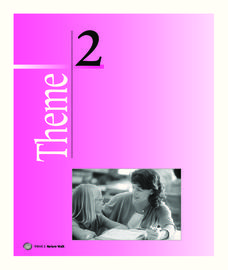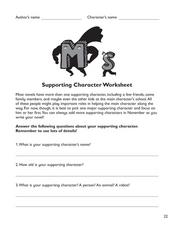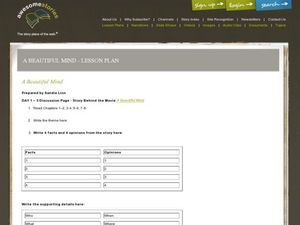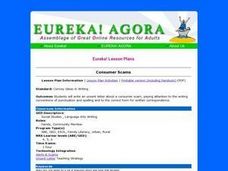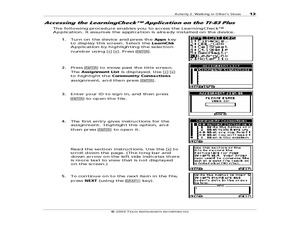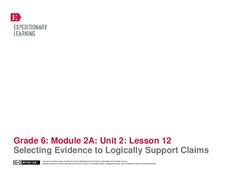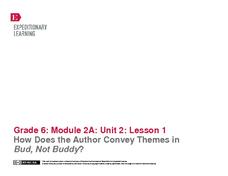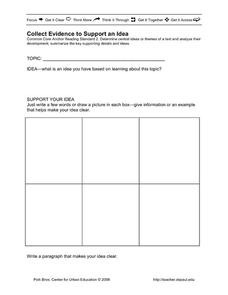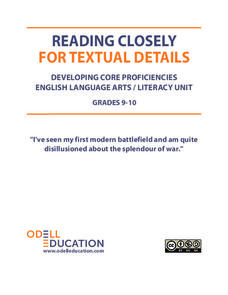Houghton Mifflin Harcourt
Nature Walk: Extra Support Lessons (Theme 2)
Reinforce concepts such as long vowels, spelling patterns, sound clusters, double-final consonants, and syllables with a nature-themed unit. Through a series of extra support lessons, learners compare and contrast using a Venn diagram,...
EngageNY
Determining Author’s Opinions, Reasons, and Evidence: Signs of Hope and Progress for African Americans in the 1920s (Promises to Keep, Pages 14–15)
Caption this. Readers look at the text features in Promises to Keep and pay special attention to the photographs and captions before adding to the Features of Informational Text anchor chart. Learners then answer questions about life in...
Curated OER
Inspiring Introverted Sensors in Your Classroom
Tips, techniques, and strategies to spark the introverted-sensing learners in your classroom.
Curated OER
Main Idea in Informational Text
Individuals complete a pre-assessment to gauge their ability to determine the main idea and supporting details in nonfiction text. They examine a new piece of nonfiction reading by looking at the table of contents, headings, and index...
Curated OER
Comprehension: Answering Questions then Rereading the Text to Identify Details in Support of the Answers
Even first graders can be exposed to good reading strategies and comprehension skills. The teacher demonstrates how to read informational text, look at the questions, reread the text, locate answer, then locate supporting details to...
Curated OER
Build Masters: Identifying Details
Find key details in books using this note card strategy. Each reader gets six cards with the classic who, what, where, when, why, and how detail prompts. After they read the book, they choose a card and locate a key detail answering the...
Curated OER
Supporting Character Worksheet
Where would Harry Potter be without Ron Weasley? Where would Holmes be without Watson? Where would a good narrative be without an interesting supporting character? Encourage character analysis with this resource, which includes six...
Curated OER
A Beautiful Mind: Main ideas and supporting details
This instructional activity that accompanies a reading of A Beautiful Mind includes over 20 questions that address theme, fact and opinion, supporting details, characterization, and quote comprehension.
EngageNY
Taking Notes Using a Graphic Organizer: Inferring About Work and Play in Colonial America
What was life like in colonial America? Follow this lesson plan and your pupils will find out what people in colonial times did for work and for fun. Ask learners to compare and contrast the two texts and explain what the reading helped...
EngageNY
End of Unit 1 Assessment: Inferring and Synthesizing (From Two Texts) About Life in Colonial America
Close your colonial America unit with a performance-based assessment. Class members will show their proficiency in several skills including using details to back up inferences, determining the meaning of words in context,...
EngageNY
Taking Notes Using a Graphic Organizer: Inferring About the Importance of Religion in Colonial America
Improve class understanding of colonial times by reading an informational text and filling out the accompanying graphic organizer. Class members work with a partner to read, take notes, make inferences, and synthesize information.The...
Curated OER
Convey Ideas in Writing
Use the platforms of the 2004 presidential candidates to bring persuasive writing to your class. Young voters identify the three issues most important to them in the election and research the issues and candidates' positions. They write...
Curated OER
Comprehension: Compare and Contrast Topics in Two Texts
A scripted lesson can be a big help for new teachers. This fully scripted three-day learning activity provides teachers with the means to demonstrate how to compare and contrast two topics in two texts. Learners will work as a class to...
Curated OER
Visualization: Cricket in Times Square
After reading The Cricket in Times Square chapter titled "Caught in the Kitchen," learners list three describing details about the characters and setting. Groups collaborate to find sensory details to support their character assertions....
Curated OER
Using Drama to Examine Communities: Walking in Others' Shoes
Encourage your readers to make connections between texts with this resource. After compiling notes for each text read (you choose the texts), groups craft skits in which major characters from each text meet. There is a rubric for the...
Curated OER
Comprehension: Identify cause and effect relationship in text
I do, we do, you do is the method and delivery of this lesson on cause and effect relationships in text. Second grade readers work with their teacher, then their peers, and finally on their own to read, identify cause and relationship,...
Curated OER
Discussion Web for The Catcher in the Rye
Is Holden Caulfield a reliable narrator? Readers use the provided graphic organizer to record specific textual evidence from The Catcher in the Rye to support their response. A teacher copy of the template is provided.
EngageNY
Selecting Evidence to Logically Support Claims
It's time to make a rule sandwich! After exploring the writing assignment's rubric and analyzing a model essay, learners are guided through the prewriting phase using the sandwich technique. Pupils create their sandwich addressing the...
EngageNY
How Does the Author Convey Themes in Bud, Not Buddy?
After reading up to chapter 12 of Bud, Not Buddy by Christopher Paul Curtis, scholars read chapter 13 and take part in a grand conversation about the author's writing techniques. Pupils discuss how his writing conveyed literary themes...
Good Project by Harvard Project Zero
The Good Project Lesson Plans
Excellence, ethics, and engagement are the three E's featured in a unit that promotes good work among elementary scholars. Through discussion, reflection, read-alouds, activity worksheets, and written responses, participants gain...
Polk Bros Foundation
Collect Evidence to Support an Idea
In order to support an idea, writers must use evidence. Your class members can prepare their evidence with this basic worksheet. Writers note down the topic they are learning about and their own idea. Next, they come up with information...
Polk Bros Foundation
How to Summarize an Event in History or Today - or a Story
Ask your class to write a quick summary of a historical or current event. The worksheet offers a place to note down important details about the event, such as time, place, people, how it started, and how it ended. Pupils then take this...
Odell Education
Reading Closely for Textual Details: Grades 9-10
Pay close attention! After finding details in a picture, scholars begin to find details in videos and text. They work together in groups, discuss in pairs, and carry out independent reading to answer guiding questions. Organizers, tools,...
Houghton Mifflin Harcourt
Nature Walk: English Language Development Lessons (Theme 2)
Walking in nature is the theme of a unit designed to support English language development lessons. Scholars look, write, speak, and move to explore topics such as camping, woodland animals, instruments, bodies of water, things found at a...


